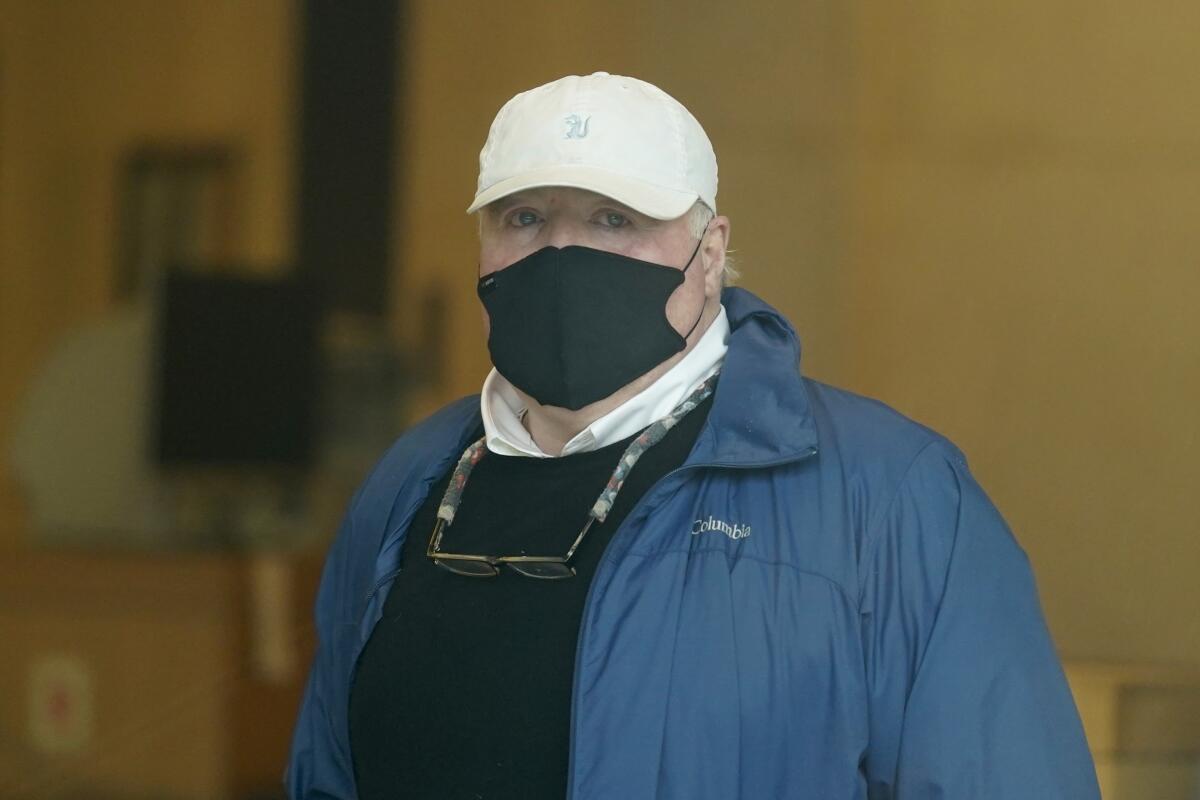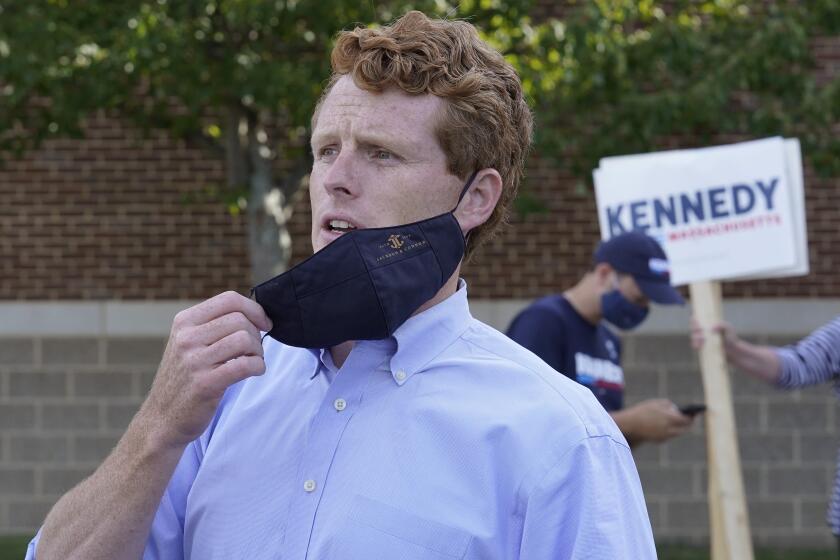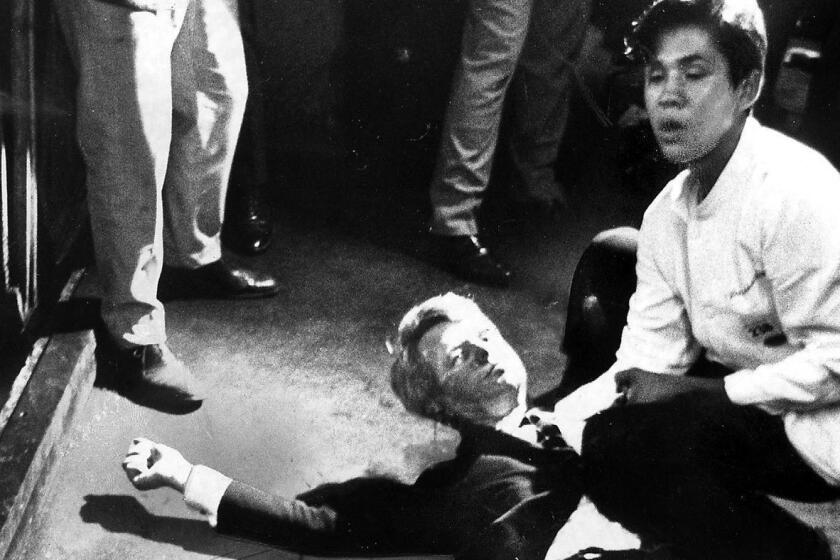Kennedy cousin Michael Skakel will not be retried in 1975 killing

- Share via
A prosecutor said Friday that Kennedy cousin Michael Skakel will not face a second trial in the killing of Martha Moxley, an announcement that came 45 years to the day after the teenager was found bludgeoned to death in her wealthy Connecticut neighborhood.
Chief State’s Atty. Richard Colangelo Jr. made the announcement at Stamford Superior Court, where Skakel and his lawyer appeared for a hearing in the case.
Skakel, a nephew of Robert F. Kennedy’s widow, Ethel Kennedy, was convicted of murder in 2002 and sentenced to 20 years to life in prison. Several appeals followed. After serving 11 years behind bars, he was freed in 2013 on $1.2-million bail after a judge overturned his conviction, saying his trial lawyer failed to adequately represent him.
The state Supreme Court upheld that ruling in 2018, and the U.S. Supreme Court declined to hear the state’s appeal last year.
Moxley’s brother, John, said outside the courthouse that he still believed Skakel killed his sister but that he and his mother, Dorthy Moxley, were at peace with the decision not to seek a second trial.
“His life will never be the same,” Moxley said of Skakel. “Mine will never be the same. I wouldn’t want to walk a mile in his shoes.”
Skakel did not comment during the hearing or outside court. His attorney, Stephan Seeger, said Skakel was innocent.
“He’s been innocent from Day 1. This crime should have never been something that ended up in a trial in the first place,” Seeger said.
The case drew wide attention because of the Kennedy name, Skakel’s rich family, numerous theories about who killed Moxley and the brutal way in which she died. Several other people, including Skakel’s brother Tommy, have been mentioned as possible killers. Robert F. Kennedy Jr. has been one of Skakel’s most prominent defenders.
No Kennedy has lost an election in Massachusetts — until now. Sen. Edward J. Markey has beaten back a challenge from Rep. Joseph P. Kennedy III in a bitter primary race. It’s the latest political dynasty to fade away.
A retrial would have presented several difficulties for prosecutors. There was a lack of forensic and eyewitness evidence against Skakel. A new alibi witness emerged. A key witness who had said that Skakel confessed is dead. And the Moxley family is leery of going through another trial.
On the night of the killing, Martha Moxley and other teens in the Belle Haven neighborhood were out pulling pre-Halloween pranks and had visited the Skakel home, police said.
Her body was found the next day on her family’s estate, across the street from the Skakel home. She had been beaten with a golf club owned by the Skakel family and stabbed in the throat with a piece of the club’s shattered shaft, police said.
At Skakel’s trial, prosecutors suggested that Skakel was angry with Martha because she had spurned his advances while having a sexual liaison with his brother Tommy.
Just ahead of the 50th anniversary of the assassination of Sen. Robert F.
Michael Skakel said he was miles away from the crime scene watching a Monty Python television show with others at the likely time Martha was killed. But prosecutors maintain he could have killed her after returning home that night.
Police interviewed numerous witnesses, but the case went cold.
Interest was revived in 1993, when author Dominick Dunne published a novel, “A Season in Purgatory,” based on the murder.
Then, in 1998, former Los Angeles police detective Mark Fuhrman, who gained notoriety in the O.J. Simpson murder case, published his own book, “Murder in Greenwich,” which asserted that Michael Skakel killed Martha in a jealous rage after seeing his brother kiss her.
Breaking News
Get breaking news, investigations, analysis and more signature journalism from the Los Angeles Times in your inbox.
You may occasionally receive promotional content from the Los Angeles Times.
Also in 1998, a one-judge grand jury was announced to investigate the killing, resulting in Skakel’s arrest in 2000 and conviction in 2002.
After Skakel was freed in 2013, prosecutors appealed to the state Supreme Court, which reinstated the conviction in a 4-3 ruling in 2016. But two years later, the high court reversed itself and tossed the conviction in a highly unusual decision, saying that Skakel’s trial lawyer, Michael Sherman, had failed to present an alibi witness.
Although Sherman, who defended his work, did present alibi witnesses at trial, they were relatives of Skakel. Justices said that if Sherman had presented witness Denis Ossorio, who wasn’t related to the Skakels, it would have had more credibility with the jury.
More to Read
Sign up for Essential California
The most important California stories and recommendations in your inbox every morning.
You may occasionally receive promotional content from the Los Angeles Times.














